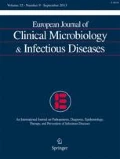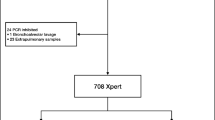Abstract
To evaluate the experience of a clinical microbiology laboratory with a DNA amplification assay for routine detection of Mycobacterium tuberculosis, the Cobas Amplicor Mycobacterium tuberculosis (MTB) polymerase chain reaction (PCR) assay (Roche Diagnostics Systems, USA) was performed on 7,722 respiratory and 1,451 nonrespiratory specimens collected from 3,321 patients. The results were compared with those of culture in conventional Lowenstein-Jensen medium, culture in the MB/BacT system (Organon Teknika, France), and clinical investigations. A total of 240 of the 254 respiratory specimens culture positive for Mycobacterium tuberculosis were also positive in the PCR assay. Of the 7,300 culture-negative specimens, 45 (0.6%) were positive in the PCR. After detailed interpretation, the overall sensitivity, specificity, and positive and negative predictive values of the PCR assay were 84.5, 99.8, 94.1, and 99.4%, respectively, for respiratory specimens. The PCR assay was more sensitive for smear-positive respiratory specimens (97.1%) than for smear-negative respiratory specimens (48.6%). Of the 18 culture-positive (smear-negative) nonrespiratory specimens, 9 were positive in the PCR. None of the 1,384 culture-negative nonrespiratory specimens were positive in the PCR. The inhibition rates detected by the internal control of the test were 2.2% for respiratory specimens and 3.4% for nonrespiratory specimens. After resolving the discrepancies, the overall sensitivity, specificity, and positive and negative predictive values of the PCR assay were 82.5, 99.8, 94.3, and 99.4%, respectively, when compared to the results of diagnostic culture. In conclusion, the use of the Cobas Amplicor MTB-PCR assay might enable clinical microbiology laboratories with considerable previous experience in molecular biology testing to perform PCR and confirm tuberculosis infection immediately, leading to improved patient management.
Similar content being viewed by others
References
Kent PT, Kubica GP (1985) Public health mycobacteriology. In: A guide for the level III laboratory. US Public Health Service, publication no. 86-2164. US Government Printing Office, Washington DC, pp 57–68
Nolte FS, Metchock B (1995) Mycobacterium. In: Murray PR, Baron EJ, Pfaller MA, Tenover FC, Yolken RH (eds) Manual of clinical microbiology. American Society for Microbiology, Washington DC, pp 400–437
Salfinger M, Pfyffer GE (1994) The new diagnostic mycobacteriology laboratory. Eur J Clin Microbiol Infect Dis 13:961–979
Eisenach KD (1999) Molecular diagnostics. In: Ratledge C, Dale J (eds) Mycobacteria: molecular biology and virulence. Blackwell, Oxford, UK, pp 161–179
Centers for Disease Control and Prevention (2000) Nucleic acid amplification tests for tuberculosis. MMWR 49:593–594
Bodmer T, Gurtner A, Scholkmann M, Matter L (1997) Evaluation of the Cobas Amplicor MTB system. J Clin Microbiol 35:1604–1605
Kubica GP, Dye E, Cohn ML, Middlebrook G (1993) Sputum digestion and decontamination with N-acetyl-L-cystein-sodium hydroxide for culture of mycobacteria. Am Rev Resp Dis 87:775–779
Tortoli E, Nanetti A, Piersimoni C, Cichero P, Farina C, Mucignat G, Scarparo C, Bortolini L, Valentini R, Nista D, Gesu G, Tosi CP, Crovatto M, Brusarosco G (2001) Performance assessment of new multiplex probe assay for identification of mycobacteria. J Clin Microbiol 39:1079–1084
Bogard M, Vincelette J, Antinozzi R, Alonso R, Fenner T, Schirm J, Aubert D, Gaudreau C, Sala E, Ruiz-Serrano MJ, Petersen H, Oostendorp LA, Burkardt H (2001) Multicenter study of a commercial, automated polymerase chain reaction system for the rapid detection of Mycobacterium tuberculosis in respiratory specimens in routine clinical practice. Eur J Clin Microbiol Infect Dis 20:724–731
Rajalahti I, Vuorinen P, Nieminen MM, Miettinen A (1998) Detection of Mycobacterium tuberculosis complex in sputum specimens by the automated Roche Cobas Amplicor Mycobacterium tuberculosis Test. J Clin Microbiol 36:975–978
Reischl U, Lehn N, Wolf H, Naumann L (1998) Clinical evaluation of the automated Cobas Amplicor MTB assay for testing respiratory and nonrespiratory specimens. J Clin Microbiol 36:2853–2860
Oh EJ, Park YJ, Chang CL, Kim BK, Kim SM (2001) Improved detection and differentiation of mycobacteria with combination of Mycobacterium Growth Indicator Tube and Roche COBAS AMPLICOR system in conjunction with duplex PCR. J Microbiol Methods 46:29–36
Huang TS, Liu YC, Lin HH, Huang WK, Cheng DL (1996) Comparison of the Roche AMPLICOR MYCOBACTERIUM assay and Digene SHARP Signal system with in-house PCR and culture for detection of Mycobacterium tuberculosis in respiratory specimens. J Clin Microbiol 34:3092–3096
Ichiyama S, Iinuma Y, Tawada Y, Yamori S, Hasegawa Y, Shimokata K, Nakashima N (1996) Evaluation of Gen-Probe Amplified Mycobacterium Tuberculosis Direct Test and Roche PCR microwell plate hybridization method (AMPLICOR MYCOBACTERIUM) for direct detection of mycobacteria. J Clin Microbiol 34:130–133
Tortoli E, Tronci M, Tosi CP, Galli C, Lavinia F, Natili S, Goglio A (1999) Multicenter evaluation of two commercial amplification kits (Amplicor, Roche and LCx, Abbott) for direct detection of Mycobacterium tuberculosis in pulmonary and extrapulmonary specimens. Diagn Microbiol Infect Dis 33:173–179
Pfyffer GE, Kissling P, Jahn EM, Welscher HM, Salfinger M, Weber R (1996) Diagnostic performance of amplified Mycobacterium tuberculosis direct test with cerebrospinal fluid, other nonrespiratory, and respiratory specimens. J Clin Microbiol 34:834–841
Piersimoni C, Callegaro A, Nista D, Bornigia S, Conti F de, Santini G, Sio D de (1997) Comparative evaluation of two commercial amplification assays for direct detection of Mycobacterium tuberculosis complex in respiratory specimens. J Clin Microbiol 35:193–196
Vuorinen P, Miettinen A, Vuento R, Hallstrom O (1995) Direct detection of Mycobacterium tuberculosis complex in respiratory specimens by Gen-Probe Amplified Mycobacterium Tuberculosis Direct Test and Roche Amplicor Mycobacterium Tuberculosis Test. J Clin Microbiol 33:1856–1859
Scarparo C, Picolli P, Rigon A, Ruggiero G, Scagnelli M, Piersimoni C (2000) Comparison of enhanced Mycobacterium tuberculosis amplified direct test with COBAS AMPLICOR Mycobacterium tuberculosis assay for direct detection of Mycobacterium tuberculosis complex in respiratory and extrapulmonary specimens. J Clin Microbiol 38:1559–1562
Thomsen VO, Kok-Jensen A, Buser M, Philippi-Schulz S, Burkardt HJ (1999) Monitoring treatment of patients with pulmonary tuberculosis: can PCR be applied? J Clin Microbiol 37:3601–3607
Clarridge JE III, Shawar RM, Shinnick TM, Plikaytis BB (1993) Large-scale use of polymerase chain reaction for detection of Mycobacterium tuberculosis in a routine mycobacterial laboratory. J Clin Microbiol 31:2049–2056
Yajko DM, Wagner C, Tevere VJ, Kocagoz T, Hadley WH, Chambers HF (1995) Quantitative culture of Mycobacterium tuberculosis from clinical sputum specimens and dilution endpoint of its detection by the Amplicor PCR assay. J Clin Microbiol 33:1944–1947
Devallois A, Legrand E, Rastogi N (1993) Evaluation of Amplicor MTB test as adjunct to smears and culture for direct detection of Mycobacterium tuberculosis in the French Caribbean. J Clin Microbiol 34:1065–1068
Hellyer TJ, Fletcher TW, Bates JH, Stead WW, Templeton GL, Cave MD, Eisenach KD (1996) Strand displacement amplification and the polymerase chain reaction for monitoring response to treatment in patients with pulmonary tuberculosis. J Infect Dis 173:934–941
Winder FG (1982) Mode of action of the antimycobacterial agents and associated aspects of the molecular biology of the mycobacteria. In: Ratledge C, Stanford J (eds) The biology of the mycobacteria. Academic Press, New York, pp 353–438
Rajalahti I, Vuorinen P, Liippo K, Nieminen MM, Miettinen A (2001) Evaluation of commercial DNA and rRNA amplification assays for assessment of treatment outcome in pulmonary tuberculosis patients. Eur J Clin Microbiol Infect Dis 20:746–750
Acknowledgement
The authors thank Efi Papanikou for excellent technical assistance.
Author information
Authors and Affiliations
Corresponding author
Rights and permissions
About this article
Cite this article
Levidiotou, S., Vrioni, G., Galanakis, E. et al. Four-Year Experience of Use of the Cobas Amplicor System for Rapid Detection of Mycobacterium tuberculosis Complex in Respiratory and Nonrespiratory Specimens in Greece. Eur J Clin Microbiol Infect Dis 22, 349–356 (2003). https://doi.org/10.1007/s10096-003-0931-5
Published:
Issue Date:
DOI: https://doi.org/10.1007/s10096-003-0931-5




